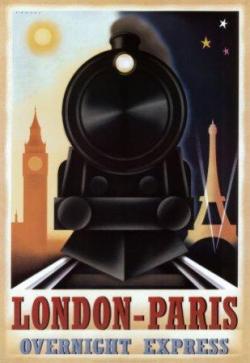Aidan Curran posted on March 04, 2010 18:00
Dateline: crack of dawn last Saturday morning. While you were snuggled up all warm in bed, your Seine-side correspondent staggered sleepily across town, up to the Gare du Nord and onto a train. Two hours later, we arrived at St Pancras station. That's how easy it is to go from Paris to London.

It was actually your blogger's first time there. The immediate reason for our long-overdue London debut was a match of rugby at Twickenham, so it was certainly a successful trip. But London made a big impression.
Paris is probably the most beautiful city in the world - and Paris knows it. The French capital can feel quite uptight and self-conscious, as if every Parisian believes he or she lives in the cold-blooded glamour of a fashion show. The sheer beauty of the place can be intimidating, like when you visit someone's new home and fear leaving mud on their carpet. Waiters and customer service staff demand respect for their authority, and the omnipresent French flags suggest an irritation with anything different or foreign. It's hard work to relax in Paris.
By contrast, London was warm and human. Its streets feel practical and lived in, like a comfortable pair of shoes. Compared to the hassle of Paris cafés, London pubs are blissful and kind. And even its monuments are idiosyncratic - despite their functionality and familiarity, Tower Bridge and the Houses of Parliament still seem so odd.
Pop music gives us proof of London's warmth and Paris's cold. There are hardly any French pop songs about Paris - certainly nothing contemporary or cool. Rap acts may rap about Paris - but only as political commentary, not as praise.
By contrast, London has been apotheosised in countless songs by its natives and residents. Waterloo Station and the nearby bridge are quite unremarkable, yet Ray Davies featured them in one of pop's most poetic songs. The Clash, The Jam, Madness and Blur have added their own layers to London's pop mythology by singing of ordinary places like Camden Town, the Tube, Hammersmith and Primrose Hill. (Of course, Paris has no pop/rock anthem to match 'London Calling'.)
Paris has inspired great painting, literature and classical music - but it has no great pop music. North American songwriters like Joni Mitchell and Stephin Merritt use Paris as shorthand for artistic freedom and old-fashioned romance respectively, but those are outsider images with little relevance to daily life Seine-side. The city's only native pop genius, Serge Gainsbourg, recorded his classic late-'60s records - including 'Je T'Aime (Moi Non Plus)' - in London and filled his lyrics with American pop culture references. There's very little of Paris in Serge's masterworks. And as we've pointed out before, the entire 'French Touch' wave of mid-'90s indietronic culture - Daft Punk, Air, Michel Gondry, Phoenix - come from Versailles.
Why is Paris so poor for pop? Well, it might be due to that intimidating air of cold-blooded glamour we mentioned earlier. Pop music is democratic and open-minded and human and un-self-conscious and fun - and Paris is none of these things. But London seems to have these qualities in abundance, hence it's the pop capital of the world.
So, is your correspondent in the wrong city? Well, that's a question for another time... Anyway, thinking of London and the future leads us nicely to four lads from Colchester who made a classic London single and video - here's Blur with 'For Tomorrow':
More ...
[Read More...]